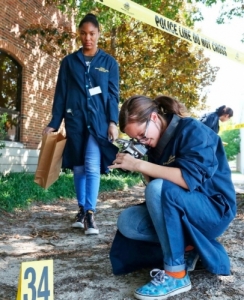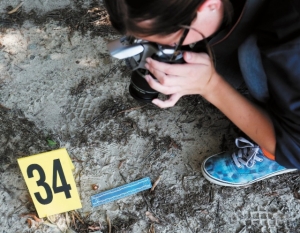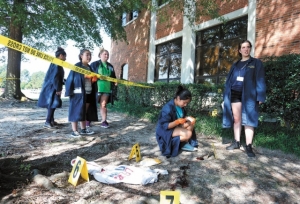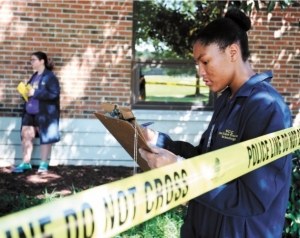Case Closed: CSI Academy at college teaches youths how to process a crime scene, just like a real investigator.
By News-Argus Staff
Published in News on July 14, 2017 2:03 PM

News-Argus/CASEY MOZINGO
Ashton Leary, 14, comes to collect evidence as Alexis Perry, 14, takes a photo of a bullet that was found at the crime scene.

News-Argus/CASEY MOZINGO
A ruler is laid down beside the evidence to show relevant size when taking photos.

News-Argus/CASEY MOZINGO
Campers collect and document evidence at a mock crime scene at Wayne Community College.

News-Argus/CASEY MOZINGO
Ashton Leary, 14, takes notes on evidence collected at the mock crime scene.
Fourteen-year-old Alayna Hill remembers watching her first crime scene investigation show on TV when she was just 7. She watched it with her grandma.
That got her interested in forensic science -- how the investigators catch a criminal through a detailed process.
That's why she and several other young ladies took the CSI Academy at Wayne Community College.
Instructor Cpl. Steven Powers, with the crime scene unit with Goldsboro Police Department, said the all-female class was very attentive and wanted to learn.
"They've got notes and notes and notes because they want to learn," he said. "They're very interested."
He said they learned about basic crime scene investigation and what a crime scene officer does. And it's not exactly the way TV portrays it.
"Typically, the scene's already secure, patrol's already lock it down and the investigator's already been called, and the investigator call you to go out and process the crime scene," Powers said. "You're not the one out there interviewing people and making the arrest.
"We also go over reality versus entertainment, like you see on TV. Reality is tougher than entertainment."
During the camp, they did fingerprinting, which 15-year-old Morgan Skinner said was challenging.
"There are certain parts you have to remember, and if you don't get it right, you can't find your suspect," she said.
Alexis Perry, 14, said she liked the fingerprinting part because "I can catch my sister in the act of stealing things from my room now."
The youths seemed to also enjoy learning all about photography.
That was the fun part for Morgan. "I have a camera at home, and I have no idea how to use it," she said. "We learned how to autofocus. And we learned how to make really cool ghost kinds of pictures. I didn't know you could do that. It's really fun."
Alexis has always liked cameras and taking pictures.
"It makes it more interesting if I can catch people doing bad things and take pictures, too," she said. "We learned about macro photography, where you can zoom in on something really close. Mrs. Powers showed us a picture of a bullet and you could look at the writing on the bullet and determine what kind of bullet it was because it was so close."
For Alexis, the most challenging part was note taking.
"We have to take really intricate notes because if you don't then you can't convict somebody of doing something bad," she said.
She originally signed up for CSI Academy because her mother told her it would be interesting. And it was.
"It's actually really cool to be able to catch people in the act of doing something bad," Alexis said.
"In my professional career, I was always thinking about being an investigative reporter, going around the world reporting on things that most people don't know about. I want to expose the truth to people who didn't even know that it existed."
CSI Academy has helped shape Morgan's career path.
"My career was going to be a pharmacy technologist, like my mom," she said. "But now I'm thinking about going into some kind of CSI career, maybe law enforcement. It's really changed my mind.
"I like helping people a lot. And I like doing the right thing. If I could get into some position where I could do the right thing, maybe I could change the world for the better."
Alayna's first career option is a registered nurse, but her second is going into the investigation business, and that's why she attended CSI Academy.
"I really like forensics," she said. "You never realize how interesting something is until you get really into it and discover so many things you never learned before."
The most challenging part of the camp for her was being very precise with fingerprints.
"If you got the brush too close, it would erase the fingerprint," Alayna said. "If you got it too far, it covered the fingerprint. It was very hard to figure out.
"You also have to be precise in the process of packaging evidence. If you make one wrong move, it could affect the whole case."
Powers said that's why he likes doing CSI Academy.
"You got kids going through high school and they're seeing TV and social media, and they believe it," he said. "Then they decide that's what they want to do then they go do it and it's not exactly what they wanted."
He said his first questions to the youths when they started CSI Academy was how many were OCD.
"I said, 'f you're OCD, you'll be a great crime scene investigator because you look at every aspect,'" Powers said. "You're out there trying to find evidence to get the perpetrator. There's a lot of good potential for some of these students to maybe one day be a crime scene investigator."
